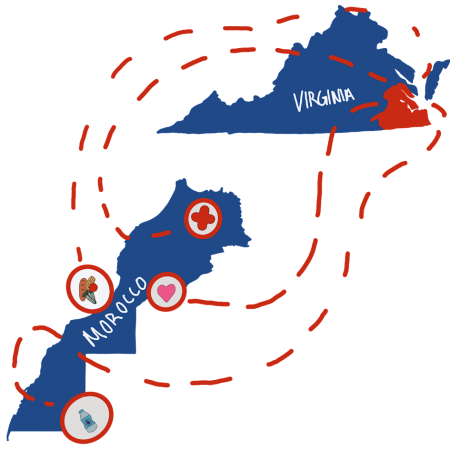Junior Joy Bowden holds up items from her “commuter survival kit” in the Batten Student Center’s “Mobile Marlins Kitchenette” that she described as a “closet.”
Lily Reslink|Marlin Chronicle
College life is often associated with students who come out of high school and live on campus as they pursue a four-year degree full-time, but plenty of students exist outside this category.
Having taken 20 years off to raise children and start a farm, Joy “Shortbed” Bowden chose to return to school. “It is time for me to get back on track with me,” Bowden said.
Although many in similar situations choose the online path, Bowden said it was important for her to be on campus. “Because I’ve been out of the classroom for 20 years, I wanted that face-to-face,” Bowden said.
For one, Bowden said she was happy with the scholarships provided to in-person students. Additionally, she said being physically present enhances conversations with other people about the material she is learning, and this is an exciting part of education for her.
Bowden has no shortage of praise for Virginia Wesleyan, specifically commending the faculty and staff that make the university what it is. “I have Linda Ferguson as my student advisor, and she’s the first student advisor that’s ever actually advised me. This is my third college,” Bowden said. For Bowden, the staff and students here are the best she has ever worked with.
Nonetheless, Bowden clarified that the experience has been no walk in the park. “I think if you are going to be a commuter, you need to be adaptable. Because you’re not always going to be warm. You’re not always going to be cool. You’re not always going to be hydrated. You’re not always going to be fed,” Bowden said.
“For you guys living on campus, this becomes home. So you learn to function in here very well. We get slammed into class and figure out how to survive the environment,” Bowden said. “It’s survival of the fittest.”
First-year commuter Mikayla Bryant resonated with this statement. As a member of the cheer team, Bryant has spent countless long days on campus. “I… have class at 10 a.m., and didn’t get out of practice until 8 p.m.,” Bryant said.
Bryant adapted to pass the time. “I spent a lot of time napping in my car before practice because there was really nowhere else for me to go,” she said.
Although the Jane P. Batten Student Center provides some lounge areas, Bryant pointed out that “Batten hosts a lot of events, especially in the Grill, so I don’t think there’s many places to comfortably sit and do work, watch TV or just relax in general.”
She explained that when these areas were full or occupied with an event, she felt at a loss for where to go. “I don’t feel the most comfortable eating or talking on the phone in the library or Greer because I found it awkwardly silent,” Bryant said.
She said January Term only amplified these schedule challenges. “[Cheer team members] had to take morning-mid or afternoon classes so it wouldn’t interfere with practice, and I had so much downtime with nowhere to lay down and nothing to do,” Bryant said.
She added that she is disincentivized from participating on the team in the future due to this. “The fact that J-Term is mandatory is really deterring me from doing cheer next year because I hated having to sleep and eat in the car just because there wasn’t enough comfortable spaces available on campus,” Bryant said.
Another problematic element for Bryant is traffic and car troubles. “I would come to cheer events or practice from home, and traffic plus car issues are extremely unpredictable, so sometimes I would miss important stuff or events just because I’m sitting in traffic or having car trouble,” Bryant said.
Many commuters echoed the severity of car and traffic challenges.
“You’re not five minutes walking distance away,” commuter Brian Ainsworth said.
Ainsworth, after serving in the Navy, chose to get a two-year degree at TCC and transfer to VWU to complete a degree in computer science.
Ainsworth pointed out that being “subject to traffic” is perhaps one of the largest added complications for commuters.
In consensus, commuter students also expressed how they would benefit from adapted meal options. Bowden brought attention to how commuters must navigate meals. For commuters who choose not to spend $400 on a meal plan, Bowden referred to VWU as “a food desert.”
Bryant also opted out of paying for the $400 meal plan due to its financial burden.
Dorothy Yanku-Palmer is a senior who spent her previous years as a commuter and is living on campus for her final year. She reflected on commuter challenges from this perspective.
Yanku-Palmer called for the “option to have some sort of a meal plan that doesn’t drain your bank account.”
In the eyes of Yanku-Palmer, transitioning from a commuter to a residential student has offered a more complete college experience, as she can be significantly more involved.
McKinley Wheeler brought up a related challenge with involvement, particularly when it comes to field experiences for classes. As a Special Education major, she said that field experiences are common but found these extra engagement activities to be more geared towards the people who live here.
Ainsworth explained that, as a commuter, more effort goes into preparing to attend classes. Commuters must consider the time it takes to drive, park, walk to the building, etc.
For Wheeler, expectations to attend extra activities beyond classes can pose added complications.
“Group projects can be tricky, especially when we have to meet outside of class,” Wheeler said. Unlike her residential classmates, she pointed out that quick meet-ups are out of the question for her when arriving to campus takes 30 minutes.
According to the university’s “Quick Facts” page, “85% of all undergraduates live in college-owned, -operated, or -affiliated housing,” presumably designating 15% of undergraduates as commuters.
By Lily Reslink
lbreslink@vwu.edu



